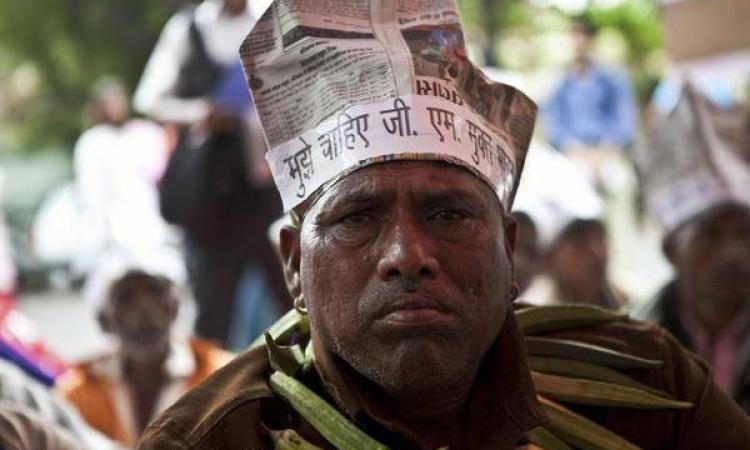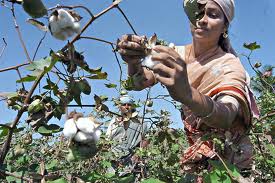
When the DNA of a plant is modified using genetic engineering techniques or biotechnology, the plant is said to have been genetically modified (GM). What does this mean to you and I? Quite simply, it means that the crop could have undergone this process in order to become something that it wasn't in the first place.
Genetic manupulation to transform food into something else isn't entirely new. Older techniques of biotechnology like the use of yeast in bread did not necessarily post a problem but the advancement of biotechnology has resulted in a lot of experimentation with crops. GM crops resistant to pests, viruses and droughts are being developed. Because tomatoes are perishable, they are modified so that they ripen slowly while they are still in transit to their final destination. Improving the nutritional content of crops is another focus area. As much as the hue and cry about these types of crops is fairly recent, the crops themselves aren't new in India.
The introduction of Bt cotton in India

Bt cotton, which was introduced in India in the late nineties, refers to cotton that is genetically modified to contain a natural toxin created by a bacteria known as Bacillus thuringiensis - hence the prefix Bt. The bacteria and its toxin have been used as conventional sprays for a long time against a major pest in cotton crop, the pink bollworm. Bollworms that ate the cotton plants used to consume and then succumb to this toxin. However, during heavy rain or drought, the spray would get washed off or become dry and ineffective. Genetic engineering helped to isolate the bacterium gene that created this toxin. This gene was then inserted into the plant, so when the bollworm ate the plant with the bacterium gene, the gene produced the toxin and killed it. While this seems like smart technology, the bollworm, over time, developed resistance to the toxin itself making the technology superfluous.
Today, the uptake of Bt cotton in India is enormous. In 2011, the Ministry of Agriculture confirmed that around ninety percent of the cotton being cultivated was under Bt. Not all have yielded great results but there are some success stories like that of Vijay Atmaram Ingle (1) who managed to increase productivity after switching to Bt cotton. Ingle says “cotton productivity ranged from 2.5 to 8 quintals per acre in 1978. But bollworm and sucking pest attack in 1983-84 brought productivity down to 5 quintals. Now, with drip irrigation and proper farming practices, Bt cotton yield is 27 quintals per acre.” That is only one side of the story.
Many farmers increasingly stress the toxic effects of the crop, which can lead to unintended consequences. Pollens from these plants carried through the wind could pollinate wild varieties of the modified plant, producing hybrids with strange characteristics. It is not possible to separate these crops from other varieties. The risk of these crops interfering with the environment is also immense, especially in the case of food grains or food crops. These risks haven't been thoroughly evaluated.
Lack of adequate testing of GM crops
The International Assessment for Agricultural Knowledge, Science and Technology for Development (IAASTD), which evaluates agricultural technologies while looking into this issue has registered its “lingering doubts about the adequacy of efficacy and safety testing, or regulatory frameworks for testing Genetically Modified Organisms (GMOs).”
The testing of these crops is far from adequate to guarantee the safety of these foods, according to Devinder Sharma, a food policy analyst trained as an agricultural scientist. These tests were done either by the companies themselves or by an accredited laboratory, but using the samples given by the companies. In countries like the US, GM food products or those that contain such ingredients are labeled so. This hasn't been implemented yet in India and likely can't be for some time to come. As a result, consumers will have no idea about what they are buying. They won't even be able to make an informed choice.
Patents and monopoly over genetic resources
Patents over Bt cotton create a monopoly over genetic resources. Also, the high rates of these GM seeds keep them far away from the common farmer. Because of their drive for more profits, corporates may fail even to give appropriate importance to safety measures. Unlike industrial accidents like the Bhopal Gas tragedy or the numerous mining-related accidents that take place, the effect of GM crops on the environment and human health could be far more dangerous.
“There is a threat of over-dependence on outside seeds at the expense of local ones leading to the threat of seed imperialism by companies like Monsanto, Syngenta and Cargill which control seventy per cent of the seed market”, according to Prof. Praveen Jha, Jawaharlal Nehru University. “With their money power MNCs purchase everybody in their way and ensure that non-GM seeds are not available to farmers in the market.”
What is the government's stand on GM crops?
Ironically, in August 2012 a report of the Parliamentary Standing Committee on Agriculture titled “Cultivation of genetically modified food crops – Prospects and effects” says that “GM crops are just not the right solution for our country” (2). The report, based on views and suggestions on the subject from various groups, had recommended a total ban on the field trials of all such crops. It discussed the role of multinational companies that charged exorbitant rates for these crops. Rather than debate further on the findings of this report, the government chose to introduce the Biotechnology Regulatory Authority of India (BRAI) bill.
What does the Bill propose?
The bill was introduced in the budget session of the Lok Sabha on April 23, 2013 by the Ministry for Science and Technology despite opposition from both within and outside the Parliament. It proposes a single window clearance mechanism for GM crops, so companies can deal with the government authorities more efficiently and easily for obtaining the relevant clearance and permit(s). Presently, it is with the Standing Committee of Science and Technology for its recommendations.

Citizens claim that the move to pass this bill is solely in the interest of biotech seed companies as it gives them a way to circumvent deterrent liability mechanisms or public scrutiny. This means that the companies will not be liable for any damage or injury caused by their seeds. At present, the Genetic Engineering Approval Committee receives and gives permissions for field trials of GM crops after the companies receive a no-objection certificate from the respective states. Currently, several states are opposing these sorts of trials since Agriculture is a state subject but if the bill is passed, the issue will no longer rest with the states.
The bill prioritises biotechnology over sustainable agriculture approaches. Critics feel that the real purpose of the bill is to enable global biotech giants gain unfettered access to Indian seeds and pesticides. The draft Bill is envisaged as a centralized technocrat-run body with no scope for democratic intervention. Political parties like CPI, CPI(M) and BJP have resolved to oppose the Bill both inside and outside the Parliament.
- The centre should not be given the authority to take decisions regarding agriculture, which is a State matter.
- The Appellate Committee that the bill provides for is drawn from the same body as the one framing and implementing the policy, thereby resulting in conflict of interest.
- The bill negates the Environment Protection Act, 1989, since it makes State-level biotech advisory committees set up under the Act redundant.
Biotechnology not a panacea – do not abandon conventional techniques
Though advocates claim that decades of basic research in cell and molecular biology have gone into understanding genetic modification, it poses many problems – both social and ethical. There are several criticisms of GM food, mostly from the point of view of risks to human health and environment. A study published in Nature (3) shows that pollen from Bt corn caused high mortality rates in monarch butterfly caterpillars. These caterpillars consume milkweed plants, not corn, but if pollen from Bt corn is blown by the wind onto milkweed plants in neighboring fields, the caterpillars could eat the pollen and perish.
Scientists have not carried out sufficient risk assessment trials to find out the impact of these crops on animal and human health. What will happen when crops engineered for pest and weed tolerance cross-breed and create ‘superweeds’? Incorporating foreign genes into food plants may have an unforeseen impact on human health. As per an article (4) published in Lancet there were considerable differences in the intestines of rats fed with GM and non-GM potatoes.
Foods containing GMOs must be clearly labeled as people have the right to know what they are eating. Experience shows that the food industry in the west has proven itself to be unreliable at self-compliance with existing safety regulations, so labeling should be mandatory and stringent in India. There is a need to explore ecological alternatives that are economically as well as socially sustainable rather than blindly promoting GM crops.
References
(1) He's the pioneer of Bt cotton in India, Snehlata Shrivastav, TNN, May 16, 2013, http://articles.timesofindia.indiatimes.com/2013-05-16/nagpur/39309085_1_bt-cotton-bg-ii-cotton-productivity
(2) Basudeb Acharya, Deccan Herald, 2011
(3) Transgenic pollen harms monarch larvae, Nature, Vol 399, No 6733, p 214, May 1999
(4) Effect of diets containing genetically modified potatoes expressing Galanthus nivalis lectin on rat small intestine, Lancet, Vol 354, No 9187, pp 1353-1354, Oct 1999